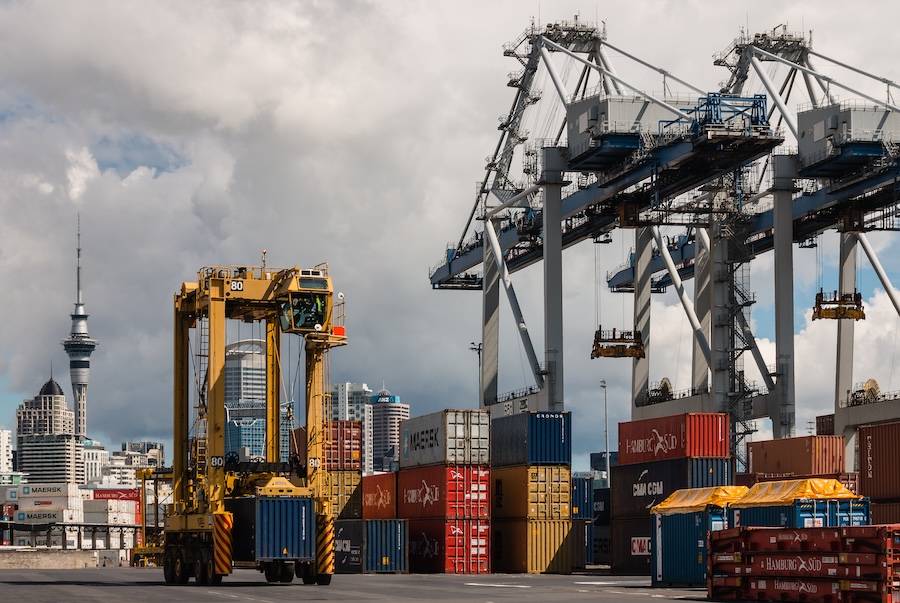The Port of Auckland has stunned the freight and logistics industry by announcing a massive 77 percent increase in its vehicle booking system (VBS) charges for 2026 – more than double the 35 percent rise it had previously signalled.
The Auckland Council-owned port’s decision is being widely condemned by the transport sector, which says the new charges will add an estimated $25 million per year in costs, with no added value or improvements in port services.
Justin Tighe-Umbers, Chief Executive of the National Road Carriers Association (NRC), called the move a “cash grab, plain and simple.”
“The Port was already on a price path to deliver the financial return Auckland Council was seeking. This sudden escalation does nothing to improve port productivity or services for customers,” he says.
The NRC represents around 1,500 supply chain businesses operating some 16,000 trucks nationwide. Tighe-Umbers said the timing of the hike – set to take effect in July 2026 – couldn’t be worse, coming during a cost-of-living crisis.
“Exporters, importers, manufacturers and ultimately consumers stand to wear the cost,” he says.
“The council will be stripping another $25 million a year out of the productive part of the economy and adding no value themselves.”
Tighe-Umbers accused the Port of acting like a monopoly. “This is classic monopoly behaviour – who else can raise prices 77 percent? They are treating the Port as a revenue tap they can simply keep turning on without consequence.”
The NRC is warning that the price gouging risks attracting scrutiny from regulators.
“The Council needs to be very careful not to overreach and attract the attention of the Commerce Commission – VBS charges have gone up an incredible 2,461 percent over the last four years.”
The port’s VBS charges have climbed dramatically since 2022, when peak-time access was priced at just $8.39. Under the new pricing, by 2026 that figure will be $230.00. Off-peak rates will rise to $100.00 – a 54 percent increase from the originally proposed $75.00.
Tighe-Umbers acknowledged that the Port had extended the timeline for the fee increase to July 2026 in response to industry feedback. But he said that was little comfort.
“In the end, the increase has still doubled, and will still impact the competitiveness of our exporters, importers and manufacturers, and in turn increase the cost of living for consumers,” he says.
“The increase is the opposite of what the Government is trying to achieve in the year of productivity and growth. As an exporting nation, every time costs increase we hurt our ability to compete on a global stage.”
The Customs Brokers and Freight Forwarders Federation of New Zealand (CBAFF) is meanwhile calling for a more balanced approach to the proposed access fee increases.
CBAFF Chief Executive Sherelle Kennelly says while CBAFF acknowledges the Port’s need to deliver financial returns to Auckland Council, the scale of the increase is unexpected and difficult to justify in the current economic climate.
“Freight businesses are already under significant cost pressure,” says Kennelly.
“A jump of this magnitude adds to cumulative access fee rises over recent years and risks further price impacts for consumers – particularly Auckland ratepayers, who may ultimately fund these increases both directly and indirectly.”
She says CBAFF members have expressed strong concern that the increase is unjustified, given the continued congestion, difficulty securing port slots, and the lack of progress in service levels, infrastructure or operational performance.
“As a council-owned asset, the Port must strike a fair balance between generating returns and supporting the economic activity it enables,” says Kennelly. “These operational cost increases will ripple through the supply chain, at a time when affordability and reliability are more important than ever.”
CBAFF also notes access charges at the Port of Auckland are now significantly higher than at other major New Zealand ports, raising questions about long-term competitiveness and modal choice.
“We support constructive dialogue with the Port,” says Kennelly.
“There is a shared interest in ensuring Auckland’s port operations remain viable, efficient and affordable. That means working together to find a sustainable path forward – one that meets both commercial goals and the broader needs of businesses and the community.”
CBAFF says it remains committed to collaborating with all stakeholders to help ensure New Zealand’s freight network continues to support trade and economic resilience.




